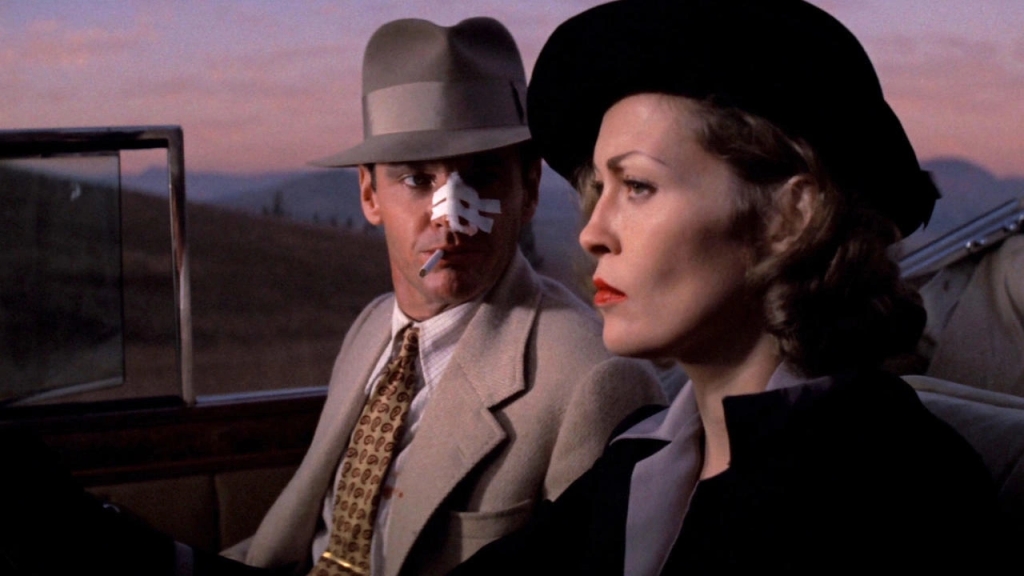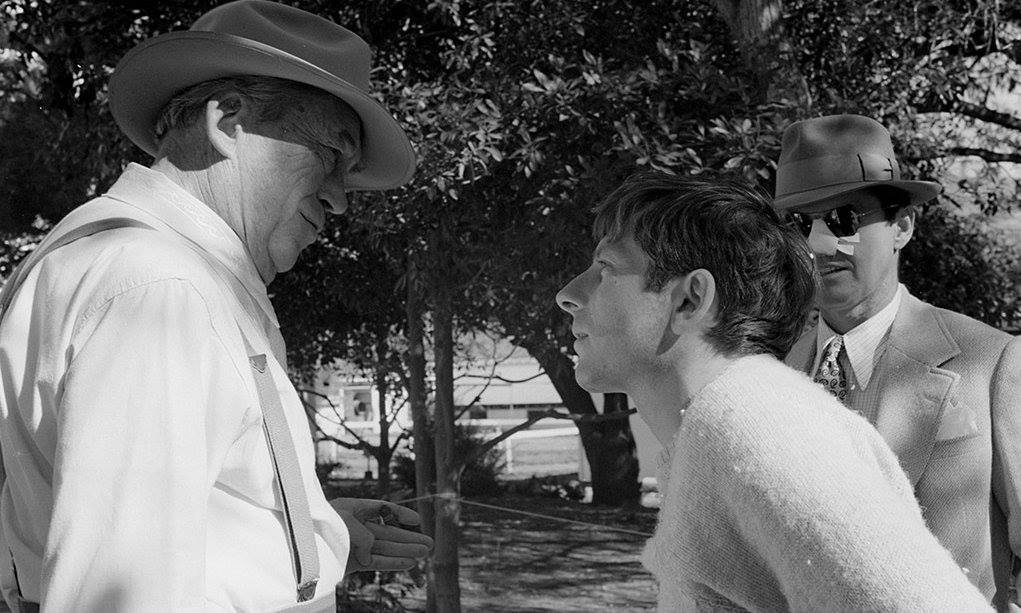It’s nice when the universe lines up just right. I’ve not too long ago just finished reading Sam Wasson’s THE BIG GOODBYE: CHINATOWN AND THE LAST YEARS OF HOLLYWOOD, his exploration of three men in the motion picture business – Roman Polanski, Robert Towne and Jack Nicholson – and how their paths diverged in the early 1970s to make this beautiful film.
And just a few months after I finished reading it, and before I had got around to rewatching it at home, Auckland’s Academy Cinemas included the film in part of their ‘Nights Of Neo-Noir’ programming last Thursday on the eve of the Easter weekend. It was a perfect screening even though I was sat two seat away from a very fidgety man, who deeply exhaled from his nostrils every 30 seconds, spent a good 20 minutes loudly picking his teeth, and thought that Faye Dunaway’s reveal in the final hour was absolutely hilarious…
This was the first time I’ve seen the film – I think – since another watch on the big screen back in the UK in the early 2000s, so it was a well-overdue rewatch.
What a glorious picture. Everything about it just exudes class. And while I’ve always had it in the back of my mind that the plot is a little on the overcooked side, I was amazed at how straightforward it is. I was just saying to a friend the other day that one of the things I tend to struggle with in the noir and mystery genres is that the plot lines can sometimes be a little (needlessly) convoluted. As though the audiences would be disappointed if the plot didn’t have multiple layers and red herrings agogo.
In CHINATOWN, with an Academy Award-winning screenplay arrived at with a great deal of pain by Towne – and then tyre-kicked by Polanski into something more akin to his doom-laden European sensibility (the downer ending is all his) – it’s all fairly simple. The chief of the local water board is found dead after discovering that someone is engineering a drought to push farmers off their arid land in order to buy it up cheap. And aside from the icky familial matters of the man behind everything, that’s mostly it…
There’s an element of the James Bond Twitter community who won’t give QUANTUM OF SOLACE the time of day – for a whole host of reasons – but one of them being that the plot revolves around its antagonist Dominic Green buying up Bolivian Land so that he can profit as the country’s sole water provider. The general consensus is that the motives of the villain aren’t Bondian enough. He doesn’t want to kill anybody with a giant space laser, or wipe out the population of the Earth with a deadly toxin, he just wants to get rich.
Now, ignoring that this is exactly the same motive behind one of the series’ greatest villains, Auric Goldfinger, the feeling among QUANTUM OF SOLACE’s detractors is that a movie plot revolving around the control of water just isn’t cinematic enough.
Ladies and gentlemen, I give you CHINATOWN – one of the American Film Institute’s top ten mystery films of all time, selected by the Library Of Congress for preservation in the National Film Registry as being ‘culturally, historically or aesthetically significant’, and regularly lauded as one of the greatest films ever made – a film about water.
Wasson’s book charts the early lives of Polanski, Towne and Nicholson, and how their respective upbringings brought them together to make CHINATOWN. Towne and Nicholson’s personal history is relatively benign – they shared an apartment while they were in acting classes with Roger Corman, Irvin Kershner and Sally Kellerman, before Towne moved into writing for Corman, and Nicholson focused on acting, moving through the ranks from the ground up.
However, in a turn of events that feel like they may have been ripped from the pages of Towne’s screenplay, Nicholson grew up thinking his mother was his sister. She had a child at 17, to an unidentified father, and as she was unmarried, the child was brought up by her parents – Jack’s biological grandparents – with her acting as his sibling.
But Polanski’s history is something else – and it’s not surprising that it was he who pushed for CHINATOWN to have a downbeat ending. Despite being born in Paris in 1933, his Polish-Jewish parents moved to Kraków in 1937 where the family were rounded up two years later and trapped in the Kraków Ghetto. His parents were both taken in raids by the invading Nazis, and Polanski grew up in foster homes, surviving by concealing his Jewish heritage.
In 1962, his first film KNIFE IN THE WATER – shot in Poland – was nominated for Best Foreign Language Film at the Academy Awards, and he moved to Paris, then London, before reaching the USA in 1968 and directing his crossover hit ROSEMARY’S BABY.
Despite surviving such a horrific childhood, it’s almost hard to believe what happened next. In 1969, his pregnant wife, the actress Sharon Tate, and four of their friends were murdered by members of the Manson Family while Polanski was in London (in pre-production for his next film THE DAY OF THE DOLPHIN, which would ultimately be directed by Mike Nichols).
Before I read Wasson’s book, I didn’t know too much about the Tate murders, aside from a few gory details, and the more truthful aspects of Tarantino’s revisionist ONCE UPON A TIME IN HOLLYWOOD. For example, I had presumed that the Manson family were either found at the scene of the crime, or somehow arrested shortly after the fact. I had seen the grisly crime-scene photos, and footage of the Manson family members turning up for their court hearing, but wasn’t sure what the time difference was between these two events (the murders took place in August 1969 and went unsolved until December 1969).
There are events during this period, recounted in Wasson’s book, which sound like the makings of a Hollywood comedy. After an initial period of absolute grief, Polanski became indignant at the LAPD’s inability to find those responsible and became an amateur detective himself. One of the clues left at the house where the murders took place was a pair of eyeglasses, which didn’t belong to Tate or any of her guests. Polanski then began to suspect members of his circle who wore eyeglasses and may have held a grudge against either himself or Tate.
Polanski found out the prescription of the left-behind glasses, and bought a tool which enabled him to check people’s glasses to see if the prescriptions matched up. At one point, his chief suspect, of all people, was Bruce Lee – the Bruce Lee! – who mentioned that he had misplaced his glasses. Polanski accompanied Lee to his opticians with the grand plan of uncovering him as the murderer.
Spoiler alert: it wasn’t Bruce Lee.
Despite what you think of Roman Polanski’s actions following the release of CHINATOWN – namely his 1977 arrest for the drugging and raping of a 13-year-old girl, and his subsequent flight from American authorities – and whether you can somehow attribute these actions to a horrific war-torn childhood and a terrible tragedy in his adult life, you cannot disregard the majesty of CHINATOWN. I’ll always struggle to understand people who can’t separate the art from the artist (for one thing, if you thought like that, you wouldn’t be left with much art to enjoy).
It’s not Towne’s fault what Polanski did. Or Nicholson’s fault. Or producer Robert Evans. Or the composer of the beautifully haunting soundtrack score, Jerry Goldsmith. Or production designer Dick Sylbert. Or cinematographer John A. Alonzo. And so on…
Hit: Love Theme From Chinatown (Main Title)
Hidden Gem: Jake And Evelyn





